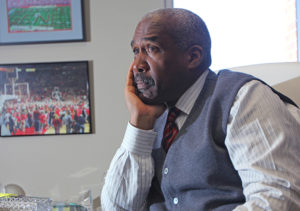By David Mullen

Photo courtesy of The Latern
Here we go again.
On May 14, the National Collegiate Athletic Association (NCAA) in essence tabled the controversial topic regarding “student-athletes” being compensated to an internal committee. The issue comes up almost every year, about the time that universities are gearing up for their upcoming — and very lucrative — football seasons. The official announcement appeared on NCAA.org.
A year ago, the NCAA issued what is known as the “Condoleezza Rice report.” The opinion was that “students ought to be able to benefit from name, image and likeness.” The NCAA has once again shuffled their feet and appointed a committee to “look at whether it is possible to allow college athletes to actually endorse products without schools needing to directly pay their athletes.”
“This group will bring together diverse opinions from the membership — from presidents and commissioners to student-athletes — that will examine the NCAA’s position on name, image and likeness benefits and potentially propose rule modifications tethered to education,” said commissioner of the Big East and working group co-chair Val Ackerman. “We believe the time is right for these discussions and look forward to a thorough assessment of the many complexities involved in this area.”
That statement got social media buzzing. Jay Bilas of ESPN wrote via Twitter that, “Player name, image and likeness rights have ‘many complexities.’ But clearly, the billions of dollars generated by conferences isn’t complex at all. Funny how that can be so easily figured out without asking ‘Do all commissioners get paid the same?’”
That premise can apply to head football coaches as well.
“While the formation of this group is an important step to confirming what we believe as an association, the group’s work will not result in paying students as employees,” said Ohio State senior vice president and athletics director and working group co-chair Gene Smith. “That structure is contrary to the NCAA’s educational mission and will not be a part of this discussion.” But it has always been mindboggling to me that university students can be paid to work in the campus library, the cafeteria or as teacher assistants, but student-athletes can’t get paid at all?
A report from Forbes stated “all that the NCAA needs to do to allow college athletes to control and license their names, images and likenesses to third parties is to add the following, simple language to its current Division I Manual: 12.01.5 Permissible Student-Athlete Licensing Rights. ‘A payment administered by a non-educational institution is not considered to be pay or the promise of pay for athletics skill, provided the student-athlete does not use the trademarks of the NCAA or any NCAA member college in any manner that may be construed as an endorsement, unless such manner is otherwise protected by principles of the First Amendment or fair use.’”
But universities and coaches are paid by sponsors for exclusive use of their branded jerseys, shoes, equipment, etc. Television networks pay billions of dollars in rights fees for college football and basketball games. For every alumni or fan who wears a college jersey with a current player’s name on the back, that player receives no compensation.
There are messy issues regarding “pay-to-play.” You have smaller sports that just don’t generate the revenue that the bigger sports do. Title IX requires a level playing field for female and male athletes. If by chance athletes were to get some sort of compensation, they would all have to be paid the same. I understand that in many cases, athletes are receiving a valuable education that can often be worth hundreds of thousands of dollars.
But college football is a dangerous sport. So are college basketball, hockey and many other university-supported sports. Careers could end on one play. Not every college player goes to the NFL or NBA.
Many athletes come from low-income homes. They devote multiple hours a week practicing, while still having to commit to their studies. They deserve to at least benefit from licensing fees that are now going to coaches, committee members and the NCAA in general.
